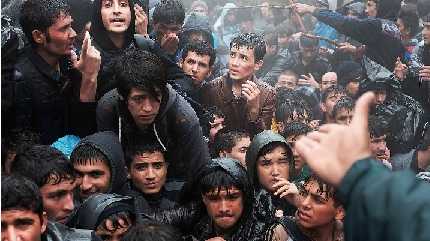
PRZEMYSL, Poland (AP) — It took Tatyana Pelykh and her 11-year-old son four days of travel and a wait of nearly 48 hours at the border crossing to escape their native Ukraine for Romania. There they found safety and a place to sleep, on the floor of a hotel conference room.
But Pelykh, a baker, says she still carries the terror of war inside her.
“I feel that my body is here, but my heart and my soul are in Okhtyrka and Kharkiv,” the cities in Ukraine where her parents and best friend remain hunkered down in basements and garages under Russian attack.
In just one week, Russia’s invasion of Ukraine has produced a refugee exodus so large that it almost matches the number of people who sought refuge in Europe in a whole year during the 2015 migration crisis.
The United Nations refugee agency said Thursday that 1 million people had fled Ukraine since Russia’s invasion, the swiftest exodus of refugees this century.
In 2015, hundreds of thousands of Syrians had fled their strife-torn country, which Russia also bombarded. Together with people escaping fighting in Afghanistan, Iraq and elsewhere, they headed west, with thousands dying at sea trying to reach a continent where many didn’t want them.
The arrival of about 1.3 million people sparked tensions among European partners, who squabbled over how many to accept, and bolstered far-right populists, some friendly to the Kremlin.
This time, as Russian forces inflict massive destruction on Ukraine, Europeans have united in extending a helping hand.
In one week, neighboring nations accepted more than 2% of Ukraine’s population of 44 million, according to the U.N. refugee agency, UNHCR. The operation has gone relatively smoothly thanks to an enormous mobilization of volunteers who have gone to the borders to help.
The European Union decided Thursday to grant people fleeing Ukraine temporary protection and residency permits. EU Migration Commissioner Ylva Johansson said millions more were expected to move into the 27-nation bloc and would require shelter, schooling and work. The U.N. refugee agency predicted the war could produce up to 4 million refugees.
Meanwhile, Ukrainians and others who had been living in Ukraine continued to arrive in Polish, Hungarian, Slovakian, Romanian and Moldovan border towns.
Among them was Nadia Zuravka, a teenager who arrived Thursday in Przemysl, Poland, with her mother. They came from Ukraine’s second-largest city, Kharkiv, which is under bombardment. She said both her school and home had been hit by bombs, and her friends were all hiding in basements.
“Everything of value to me” has faced some kind of destruction, she said.
Poland, a neighboring Slavic nation where many Ukrainians have settled in recent years for work, has received the largest single group of refugees so far, with many being taken in by relatives or friends. Many refugees continue moving west to countries like Italy and Germany.
Volunteers and local authorities at border crossings meet exhausted people who have been traveling for days. They serve food or guide the newcomers to shelters; sometimes they take strangers into their own homes. Children arriving with cancer were evacuated to hospitals in Poland.
Pope Francis thanked Poland for its role in helping refugees, praising the country’s people for “opening your borders, your hearts, the doors of your homes.”
People from across Europe are helping too, even as they struggle with their own fears of what this dangerous new chapter holds for a continent that has faced so much bloodshed in past wars.
Luc Dedecker drove 1,650 kilometers (1,025 miles) from his home in Belgium to Przemysl, stopping only to sleep in his car. He was prepared to take strangers back to his place.
“People need to be helped,” he said. He also described a profound fear of Russian President Vladimir Putin.
For Poles, Russia’s attack on Ukraine evokes memories of their own country’s double invasion in 1939 by Nazi Germany and the Soviet Union. The German invasion triggered World War II and a brutal five-year occupation that killed 6 million Poles, including 3 million Jews murdered in the Holocaust.
Scenes of destroyed Ukrainian cities today recall the look of Polish cities leveled by German bombardments during the war.
Some Poles described helping Ukrainians now as part of a struggle by the democratic West to defend their own liberty, since sheltering Ukrainian women and children frees men to fight at home.
“We think that if Ukrainians fight and win, we will be safe. Now, we are not safe,” said Bartosz Tomaszewski, a 28-year-old Pole in a yellow security vest that marked him as a volunteer.
He was guiding people coming off trains in Przemsyl, where he has traveled each day from his home in nearby Rzeszow.
Tomaszewski fears that if Ukrainian President Volodymyr Zelenskyy fails to stop Putin, Poland could be next, along with the Baltic nations of Lithuania, Latvia and Estonia.
Pelykh, the Ukrainian refugee in the Romanian border town of Siret, hopes people in Russia “will read about this and think about what is happening now (in Ukraine). It’s not photoshop, it’s not fairy tales. It’s real, it’s real. It’s in my town.”




